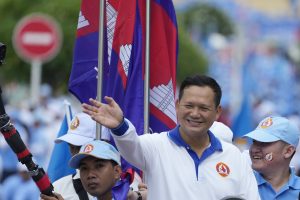Hun Manet’s first 100 days as prime minister show that Cambodia’s leadership has no vision for the future and that an effective transfer of power has yet to take place.
The new prime minister took over from his father Hun Sen on August 22. His lack of credibility was immediately clear when he addressed the United Nations General Assembly in September, claiming that the national elections held in July were free, fair, and credible.
As was the case in 2018, no recognized opposition party was allowed to run. Hun Manet has no democratic mandate and embarrassed himself internationally by pretending that he does. His father gave him his job on a plate because Hun Sen needs to ensure his own impunity from prosecution. Democratic countries refused to send observers to the July “elections” because there was nothing to observe.
Cambodia has more than 60 political prisoners, locked up for nothing more than criticizing a dictatorship and showing support for democracy. Hun Manet has yet to release a single one of them. The prisoners include Kem Sokha, the leader of the peaceful democratic opposition party, the Cambodia National Rescue Party (CNRP), who was arrested shortly before the party was dissolved by the politically controlled Supreme Court in 2017. Among the prisoners is also a U.S. citizen, Cambodian-American lawyer Theary Seng, convicted as part of a mass trial of dissidents in 2022.
New prisoners, or more accurately hostages, continue to be seized. Kang Saran, who has no political affiliations, was sentenced in November to three years in prison simply for criticizing the government on issues including corruption and economic insecurity on Facebook.
Hun Sen’s ingrained habit of forcible displacement of the population whenever convenient is being continued under his son. A report published by Amnesty International this month found that 10,000 families have been affected by forced displacement from Angkor Wat in the name of attracting more tourists. Many of the families have lived there for generations. They have been shipped off to a barren relocation site, remote from workable agricultural land, and told to build new homes with a few sheets of corrugated iron and a tarpaulin sheet.
Managing tax policy is clearly beyond the new prime minister. Cambodia’s dire economic position means that tax collections in the first eight months of the year were 21 percent lower than projected in the budget. Hun Sen had to step in to steer his son away from plans to increase existing taxes and introduce new ones. In foreign policy, Hun Manet has simply continued his father’s reliance on China, which props up the regime in return for the right to operate the illegal and unconstitutional military base at Ream, the scale of which continues to increase. The new prime minister’s first trip abroad was to Beijing.
Microfinance, Cyberslavery
Nearly 45 years after the fall of the Khmer Rouge, Cambodia remains a least-developed economy, with the population struggling with one of the highest levels of microfinance debt relative to incomes in the world. Research published in August by Equitable Cambodia and LICADHO shows that hunger, child labor, and forced land sales have been the direct consequences of microcredit borrowing in Kampong Speu province.
The burden of excessive debt is literally tearing families apart. Many Cambodians have emigrated to Thailand in search of work to service family loans, with the Khmer community in the country now standing at about 2 million. Many microcredit lenders stipulate a condition that a family member must be working in Thailand, as they know there is no chance of a loan being repaid from Cambodian earnings.
Neither Hun Manet nor his father have done anything to ease this burden of excessive debt, which is often used simply to ensure hand-to-mouth existence rather than to invest in small businesses. A Gallup survey in August concluded that there is no country in the world in which the gulf between the rich and the poor in terms of ability to afford food is wider than in Cambodia. The only way to gloss over Hun Manet’s lack of policies to improve matters is to kick the aim of an advanced economy into the distant future – in his case, until 2050.
Meanwhile, cyber-slavery continues to exact a heavy human price, while deterring Chinese tourists from visiting Cambodia. Criminal Chinese gangs operate a network of compounds in Cambodia centered on Sihanoukville, in which young people, usually from China but also from many other countries, are tricked with the promise of real jobs. They find themselves trapped as slaves and forced to carry out online scams. The racket flourishes with official connivance. Slave victims who thought they had been rescued by the police have reported that the Cambodian police are willing to send them back to the slavemasters for the right price.
The truth is that Hun Manet is nothing more than an over-promoted spokesperson for his father, the dictator who officially ruled Cambodia for nearly four decades. Hun Manet has no independent political standing or track record, and if he has any ideas that are not those of his father, he has yet to reveal them. Hun Sen has already said that he will take over again as prime minister from his son if necessary. Hun Manet’s failure to muster any credibility to date make that a realistic possibility.
It is useless to look for signs of positive change under a “new regime” when a transfer of power has not in fact taken place. That day will come, as there is no evidence that Hun Manet is capable of governing without his father as back seat driver. When it does, Cambodians will be desperate to take the first opportunity to achieve a transition to democratic rule.

































